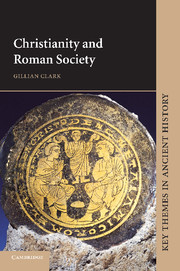6 - Triumph, disaster or adaptation?
Published online by Cambridge University Press: 05 June 2012
Summary
Never arrange a marriage. Never recommend anyone for public service. Never accept a dinner invitation in your home town.
(Advice from Ambrose, bishop of Milan, on being a bishop: Possidius, Life of Augustine 27)Give me, emperor, the earth cleansed of heretics, and I will give you heaven in return. Help me eliminate heretics, and I will help you eliminate the Persians.
(Nestorius, newly appointed bishop of Constantinople 428–31, in a public address to Theodosius II: Socrates, History of the Church 7.29)At the beginning of the fourth century Christians were experiencing the most sustained and intensive effort ever made to eliminate their religion (ch. 3). Ten years later Constantine and Licinius, then co-rulers of the Roman empire, declared freedom of religious belief and worship, and specifically ended the persecution of Christians. At the end of the fourth century, Theodosius I and his imperial colleagues declared to the Urban Prefect of Rome that anyone who engaged in animal sacrifice, visits to temples or veneration of images offended against divine and human law (C. Th. 16.10.10, 391 ce). The penalties remain vague unless the offender holds public office. Any official who enters a temple to worship, and any member of his staff who fails to report him, is liable to a heavy fine, on a sliding scale according to his status.
- Type
- Chapter
- Information
- Christianity and Roman Society , pp. 93 - 117Publisher: Cambridge University PressPrint publication year: 2004



